
On December 26th, the 2023 Maritime Guangdong Young Director Support Program (Maritime Guangdong Program) held a special screening of Chaoshan short films at Shantou University. This event marked the second appearance of the short films created by young directors from the Maritime Guangdong Program at a university, following their screening at Jinan University. The three films screened that evening resonated deeply with the students and faculty of Shantou University.
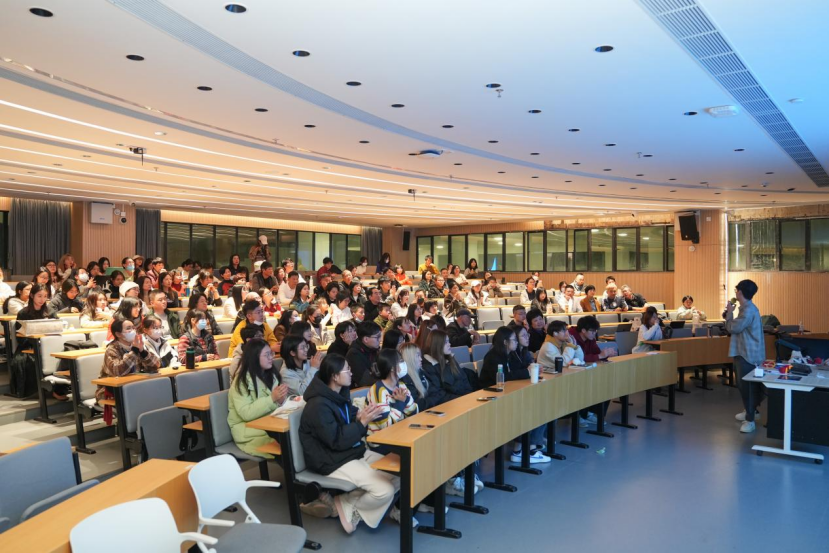
The screening series was organized by Yangcheng Evening News, with joint sponsorship from the Cheung Kong School of Journalism and Communication and the Cheung Kong Industrial Design Center at Shantou University.
Chaoshan short films deeply touched the students and faculty of Shantou University
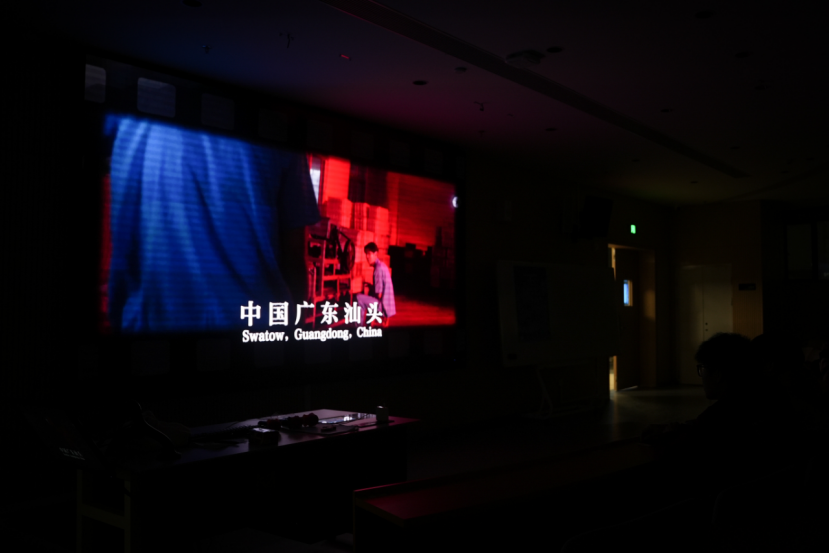
As a century-old academic institution in Shantou, a renowned hometown for overseas Chinese, Shantou University is infused with a strong sense of attachment to its roots. The three short films screened that evening were all set in the Chaoshan area and directed by Chaoshan natives. Among them is Chen Jianhang, a graduate of the 2011 Class from Shantou University who majored in broadcasting and television.
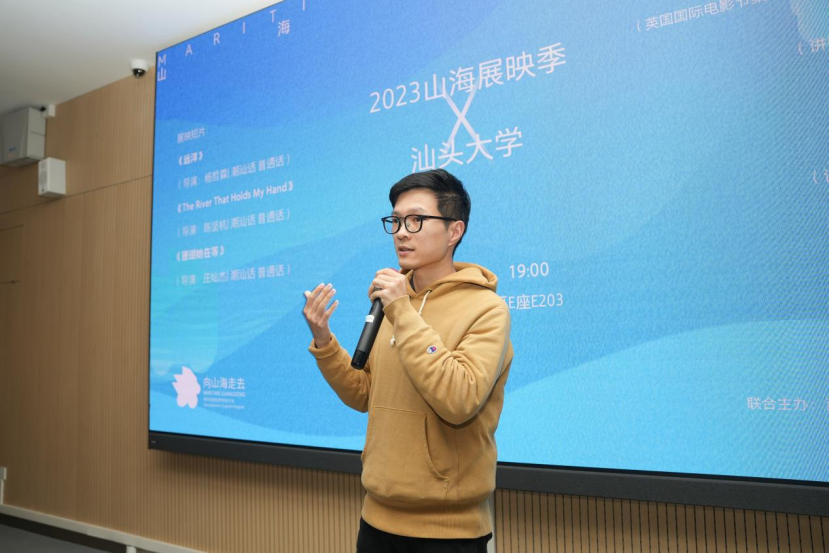
Director Adam Yang's "My Brother" depicted the lives of ordinary people in the Shantou Special Economic Zone in the 1990s, which were condensed within a canning factory. Director Zhuang Canjie's "The Returning Island" utilized the imagery of the Chinese sea goodness Mazu to tell a unique Chaoshan legend with a distinctive artistic style. Director Chen Jianhang's "The River that Holds My Hand" evoked nostalgia through a touch and a black-and-white photograph, unraveling the memories of a dispersed family across different eras.
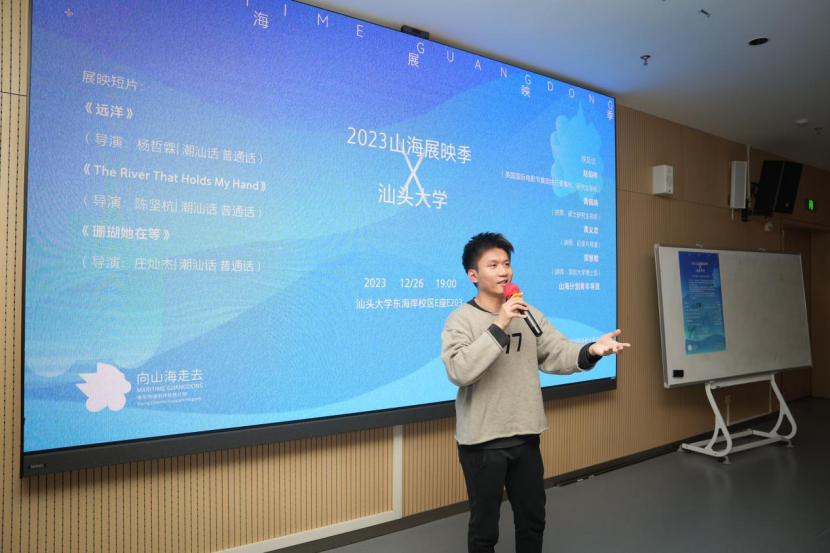
After the screening of the three short films, enthusiastic applause filled the venue. Zhao Bozuo, a postgraduate tutor at the Cheung Kong Industrial Design Center, Huang Peiying and Huang Yizhong, lecturers from the Cheung Kong School of Journalism and Communication, engaged in discussions with the directors on the scene. Students also eagerly shared their viewing experiences.
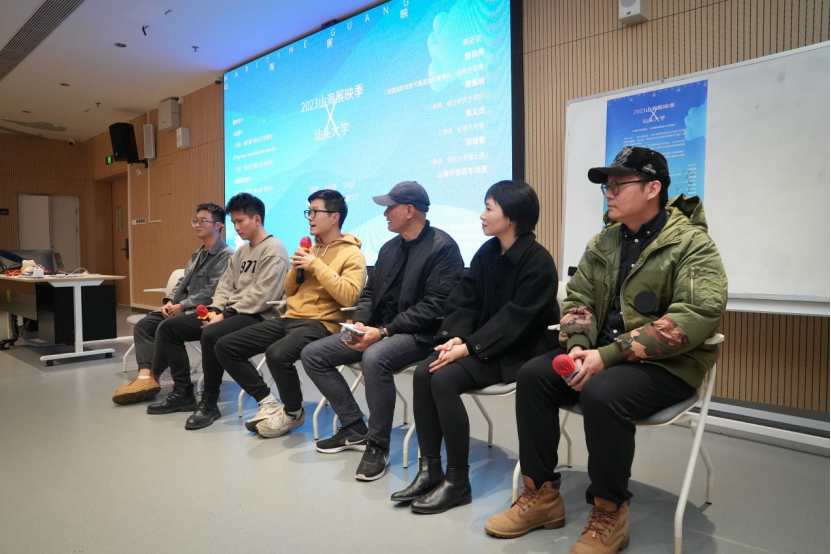
A student from the Chaoshan area said that the recently screened short films profoundly impacted them and posed a pertinent question: how can we incorporate Chaoshan cultural elements like the nursery rhyme "Give you hugs," into the visual medium and establish effective cross-cultural communication that can resonate with audiences from diverse regions?
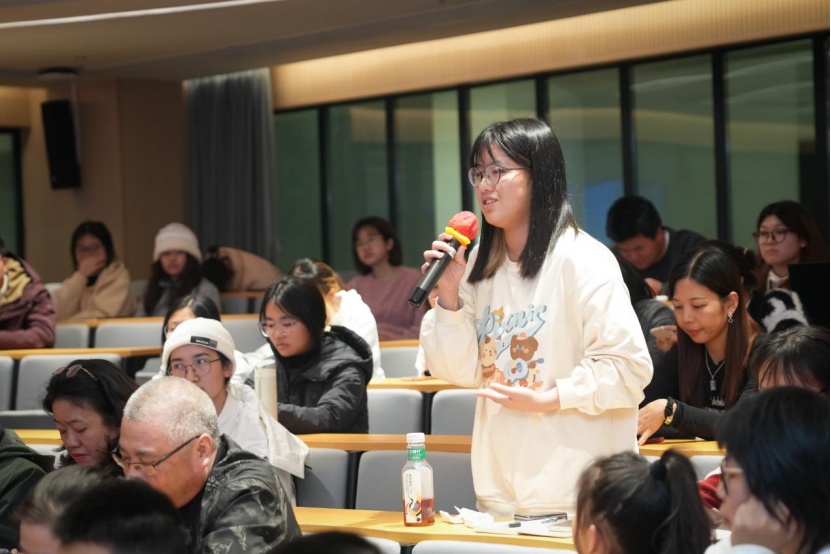
Zhuang Canjie said that while filming the Chaoshan movie "Overseas Chinese"(《番客》), some viewers who didn't understandtheChaoshan dialect were still able to grasp the emotions conveyed in the film. He further added that forms may vary, but emotions are universal. Similarly, Adam Yang emphasized that the most crucial aspect is not the form, but the story that encapsulates Chaoshan elements can help the audience naturally sense its essence.
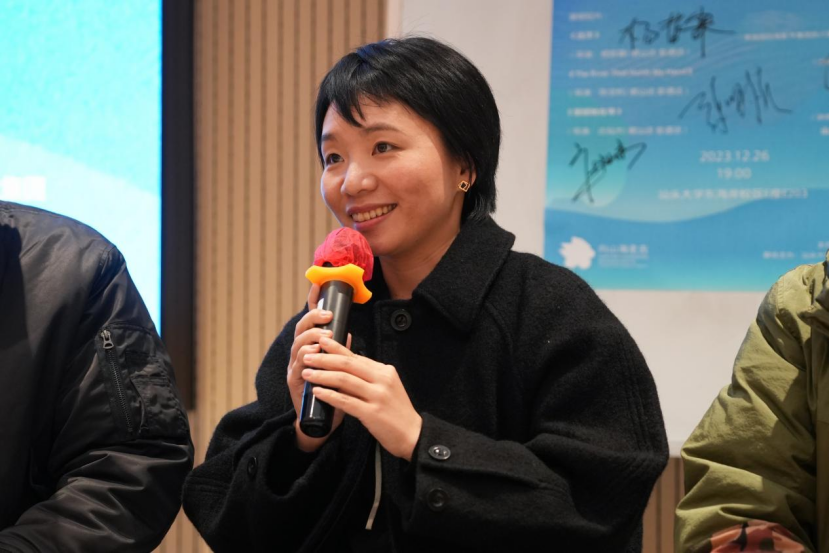
Huang Peiying affirmed the emotional expression in these short films, saying, "Although I am not from Chaoshan, I can feel the emotions conveyed in the films. Many elements in the films engage in dialogue with the sea, which makes me appreciate the valuable cultural inclusiveness. Cross-cultural communication should follow suit."
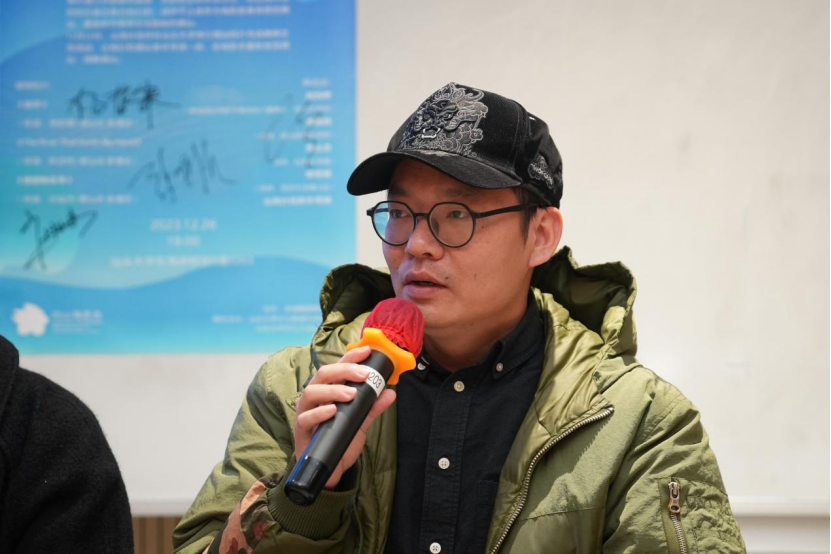
Huang Yizhong responded, "With the current booming development of social media, the issue is not about dissemination but rather the presence of good topics and stories." Zhao Bozuo, focusing on the target audience, believes that by exploring the essence of Chaoshan culture and uncovering its distinctive features, a breakthrough can be made. He advised uncovering the most compelling stories based on audience characteristics and initial research.
When interviewed by reporters, Student He, who majors in journalism, said, "I come from Jiangmen, Guangdong, and I don't understand the Chaoshan dialect. However, through the dialogues in films and Chaoshan nursery rhymes, I deeply appreciate the emotional expression within them. These young directors are our role models who inspire us to strive relentlessly in film and television creation." Student Ma from Shantou, Guangdong, excitedly told the reporter, "Among the three short films, my favorite is 'The Returning Island'. This film records the cultural customs of the previous generation, which is beneficial for inheriting Chaoshan culture and also helps enhance the locals' sense of belonging to their hometown."
Scholars from Shantou University praise the importance of staying true to one's original aspirations
Huang Yizhong affirmed the thematic intention of the three short films that revolved around the search for mothers that night. He summarized them as follows: "'The River that Holds My Hand' depicts an unsuccessful search for a mother; 'My Brother' portrays a tumultuous journey in the search, ultimately finding the mother; 'The Returning Island' sets itself apart from the previous two by transforming 'mother' into'maternal love.'"
Regarding the slow-paced narrative of "The River that Holds My Hand", which differs from the fast-paced audiovisual habits of the present, Chen Jianhang explained,"I have always liked long shots, as they leave more space for the audience to immerse themselves in contemplation. The sound was not recorded in post-production but captured in real-time. The essence of a film lies in its authenticity."
Huang Yizhong further explained, "Broadly speaking, this is a documentary adapted from a true story and featuring real characters. There is no staging, no climax, and no traditional narrative structure. It is a departure from storytelling conventions." He pointed out that the unique value of this film lies in the use of lens, which brings the audience to engage in dialogue with the visuals and contemplate the director's intentions.
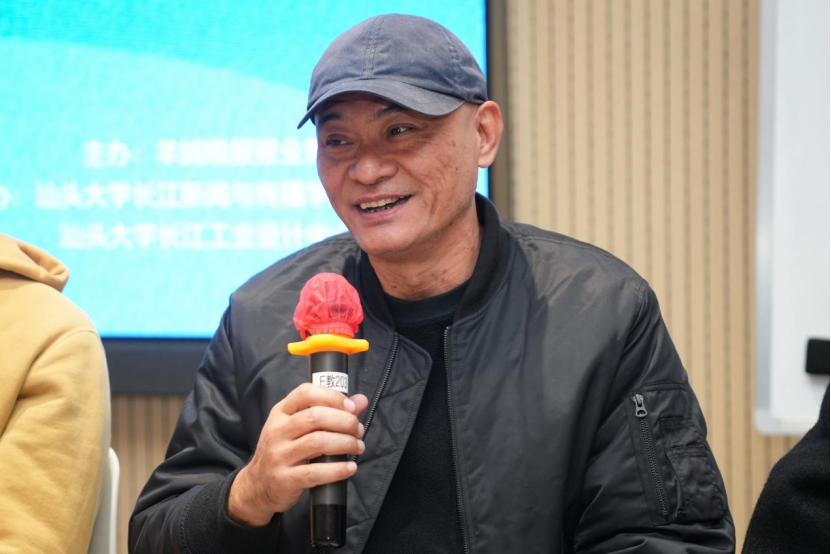
Huang Peiying said, "I really enjoy slow-paced films. Although such films may not align with the current fast-paced audiovisual habits of the general public, they still have a certain audience base. It is crucial to stay true to the original intention of making films." Zhao Bozuo explained, "Long shots are just a form that is not a prerequisite for art films."
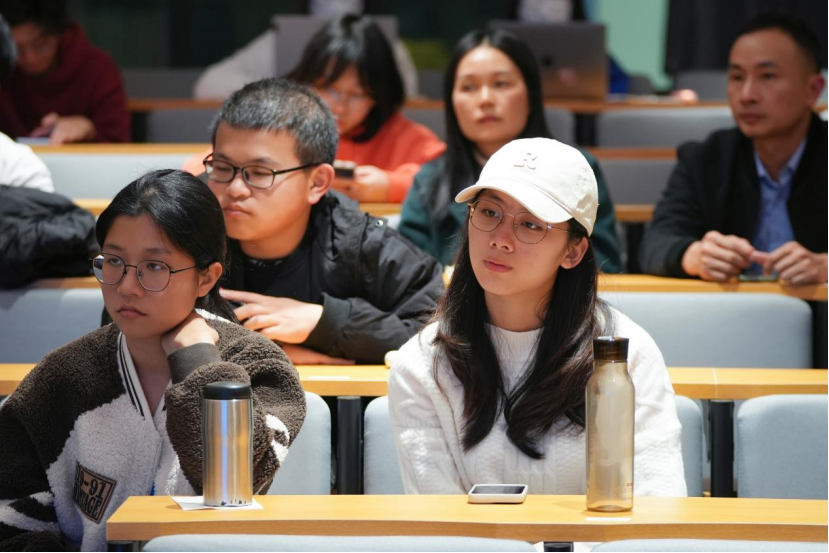
Joining hands with the Maritime Guangdong Program to foster collaboration in education
During the interactive activities, mentors from the college and directors shared their experiences with the younger generation. Huang Peiying advised watching and pondering more about the movies:"The meaning of films can be interpreted differently depending on when and where they are watched." Huang Yizhong encouraged students to experience life more and discover its nuances."Life is the best script. Only through input can there be output."
Chen Jianhang motivated the younger generation with his own experience at Shantou University: "Since my freshman year, I have been making films and participating in film crews, accumulating experience through the production of various works. During my university years, I was involved in the creation of ten productions. So, dare to try and take the first step." Adam Yang shared his habit of collecting materials, saying, "Listen, think, and observe more. Whenever inspiration strikes, jot it down in a memo. Find the contradictions and conflicts within the materials." Zhuang Canjie encouraged students to firmly pursue what they love. "Images can combat forgetfulness and record the subtle changes in our hometown. If you have a passion, stick to it."
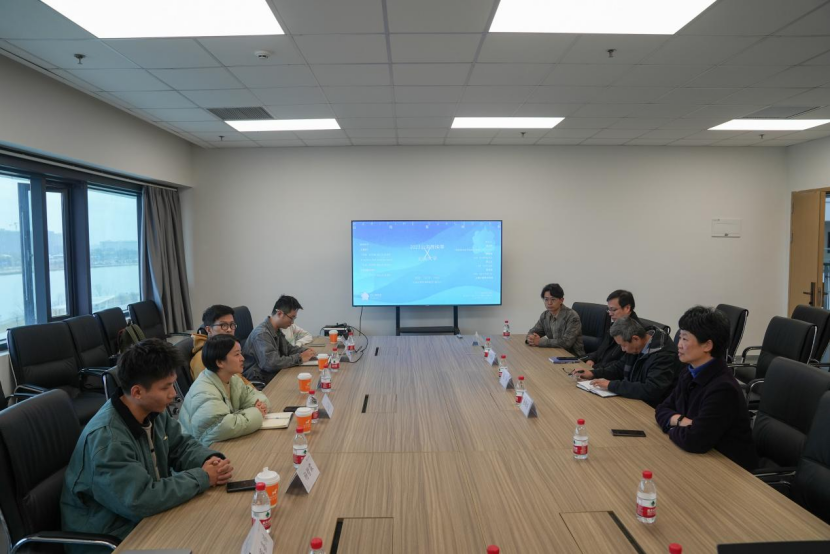
In the afternoon, in-depth discussions regarding further cooperation were held between the leadership of the Cheung Kong School of Journalism and Communication and the team of the Maritime Guangdong Program. Yu Shanyan, the Communist Party secretary and Vice Dean of the college, said that film is an important medium for cultural dissemination, and the Maritime Guangdong Program holds great significance in telling Lingnan stories effectively. The college will encourage and guide students to participate in this practical project, bridging the gap between academia and the industry.
Hong Mengdian, Deputy Communist Party Secretary of the college, said, "The screening event of the Maritime Guangdong Program has been well-received by Shantou University students, and there has been an enthusiastic response to the film viewing notices." He looks forward to future collaboration with the Maritime Guangdong Program in the future to establish a mentor workshop, empowering both parties in their collaborative development. Mao Hao, the head of the college, believes that the Maritime Guangdong Program captures vibrant life topics and employs the narrative power of visuals to create stories that are simultaneously profound and significant, which resonates widely among the younger generation. With the college's abundant faculty resources in the field of film and television, and the Maritime Guangdong Program's expertise in content production and dissemination, their profound collaboration will pave the way for new horizons.
山海展映走进汕大,潮汕短片引发共鸣
2023“向山海走去”青年导演创作扶持计划(以下简称“山海计划”)12月26日在汕头大学举办潮汕短片专场“山海展映季×流动岭南”学术展映系列活动。这是“山海计划”青年导演创作的短片在暨南大学展映后再度亮相高校。当晚展映的3部短片引发了汕大师生的情感共鸣。
本次“山海展映季×流动岭南”学术展映系列活动由羊城晚报报业集团主办,汕头大学长江新闻与传播学院、汕头大学长江工业设计中心联合主办。
汕大师生深受潮汕短片触动
作为百年侨乡汕头的特色学府,汕头大学满载华人华侨心系桑梓的浓郁情怀。当晚展映的3部短片均取材于潮汕地区,导演也均为潮汕籍,其中,陈坚杭还是汕大2011级广电专业的学生。
杨哲霖的《远洋》是浓缩于罐头厂里的20世纪90年代汕头经济特区小人物速写;庄灿杰的《珊瑚她在等》借由妈祖子母像书写画风独特的潮汕奇谭;陈坚杭的《The River that Holds My Hand》因一记触摸踏上旅程、一张黑白照凝练乡愁,细数家族流散背后的时代记忆。
3部短片展映后,现场响起热烈掌声。汕头大学长江艺术与设计学院硕士研究生导师赵伯祚,汕头大学长江新闻与传播学院(以下简称“学院”)讲师黄佩映、黄义忠在现场与导演交流,学生们也踊跃分享自己的观影感受。
一名来自潮汕的学生表示短片直抵人心深处,但也有疑惑:“如何把诸如童谣《拥啊拥》等潮汕文化元素融入影像,实现跨文化传播并与外地观众共情?”
庄灿杰表示,他在拍摄潮汕电影《番客》时,有些观众虽然不懂潮汕话,但都能理解其中的情感,“形式可以多变,但情感是共通的”。杨哲霖同样认为形式不是最重要的:“故事蕴含潮汕元素,观众自然能感受其中的内涵。”
黄佩映肯定了山海短片的情感表达:“我虽然不是潮汕人,但能感受到电影的情绪;片中诸多元素与大海形成了对话,令我深感文化包容性难能可贵,跨文化传播也应如此。”
黄义忠回答道:“当前社交媒体蓬勃发展,传播不是关键问题,问题在于有没有好的选题和故事。” 赵伯祚聚焦受众群体,认为潮汕文化精华荟萃,挖掘其中的差异化特点是突破口:“根据前期调研,考虑受众的特点,挖掘你认为最值得叙述的故事。”
就读新闻学专业的何同学映后接受记者采访时表示:“我来自广东江门,不懂潮汕话,但通过电影中的台词和潮汕童谣,深切体会到其中的情感抒发。青年导演们是我们学习的榜样,激励我们在影视创作不懈努力。”来自广东汕头的麦同学兴奋地向记者说道:“3部短片中,我最喜欢《珊瑚她在等》,这部片记录了上一代人的文化风俗,对传承潮汕文化益处很多,也有助于增强本地人的家乡归属感。”
汕大学者点赞:坚守初心至关重要
黄义忠肯定了当晚3部短片以寻找母亲展开的主题立意,将它们精练地概括为:“《The River that Holds My Hand》寻母未果;《远洋》虽寻母过程坎坷,但最终是找到了;《珊瑚她在等》则有别于前两部,把‘母亲’化身为‘母爱’。”
针对《The River that Holds My Hand》剧情推进节奏舒缓,有别于当下快节奏的视听习惯,陈坚杭解释:“我一直很喜欢长镜头,可以留给观众更多沉浸思考的空间,声音也没有后期录制,而是使用即时的声音。电影最关键的就是真实。”
黄义忠进一步讲解:“从广义上来看,这是一部纪录片,改编自真实故事,拍摄真实人物,没有任何摆拍、没有高潮迭起和起承转合,是去故事化、去叙事化的。”他指出该片的独特价值在于:“运用‘凝视’的方式,让观众必须与画面对话,思考导演的用意。”
黄佩映表示:“我非常喜欢慢节奏电影,尽管这类影片不太符合目前大众快餐式的视听习惯,但也有一定的受众人群,坚守拍电影的初心至关重要。” 赵伯祚现场科普:“长镜头只是一种形式,并不是文艺片的标配。”
牵手“山海计划”,协同育人
互动环节的最后,学院导师和导演们为晚辈分享了成长经验。黄佩映建议多看多想:“电影永远都是看出来的,在不同地点,不同时间看,会有不同收获。”黄义忠鼓励同学们多体验生活,发现生活:“生活是最好的剧本,只有输入才有输出。”
陈坚杭以自己就读汕大的经历激励后辈:“从大一开始,我就拍片子,参加剧组,从一部部作品的实践中积累经验,大学期间参与主创10部作品。多去尝试,迈开第一步。”杨哲霖分享了自己积累素材的习惯:“多听多想多看,有灵感随时记到备忘录,找到素材中的矛盾与冲突。”庄灿杰鼓励同学们坚定做自己热爱的事情:“影像可以对抗遗忘,记录故乡变化的点滴,喜欢就坚定去做。”
当天下午,围绕进一步携手合作的事宜,学院相关领导与“山海计划”团队开展深入交谈。学院党委书记、副院长余珊燕表示,电影是传播文化的重要媒介,“山海计划”对于讲好岭南故事颇具意义,接下来将鼓励引导学生参加该实践项目,将理论知识付诸实践,实现学界与业界无缝对接。
学院党委副书记洪蒙典说:“山海展映活动深受汕大学生喜爱,观影通知发布后,同学们报名踊跃。”他期待未来联手“山海计划”,打造导师工作坊,为双方协同发展赋能。
学院负责人毛浩认为,“山海计划”采集鲜活的生活素材,运用影像的叙事形式,使故事兼具深度与厚度,在青年群体中广受欢迎;学院拥有丰富的影视专业师资力量,“山海计划”团队擅长内容生产与传播,双方的深度合作将开拓出崭新天地。
文 | 记者 詹锡伟
图 | 记者 蔡嘉鸿
译|陈萱
-
Millions of flowers to bloom at Guangzhou's 2023 Spring Festival flower fair
2023-12-29 22:58:40 -
Big stage performances await in 2024
2023-12-29 22:58:42 -
Shenzhen-produced ‘Wing Chun’wows Hong Kong audience
2023-12-29 23:04:10 -
Huangpu Luogang witnesses 4000 full-blooming plum trees
2023-12-29 23:04:10






